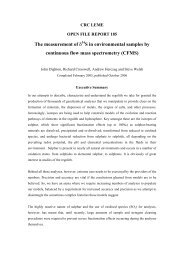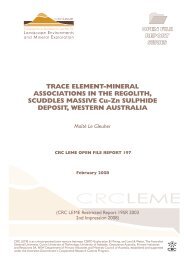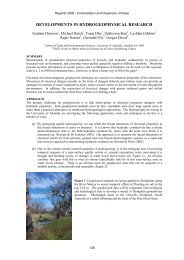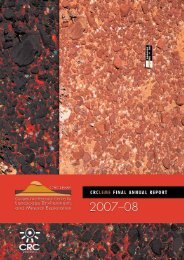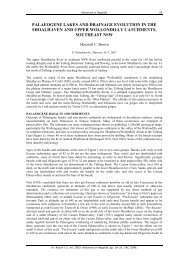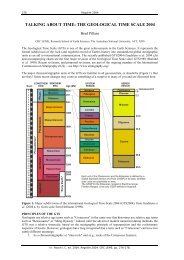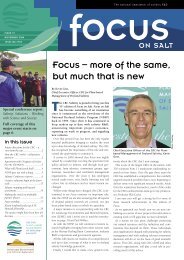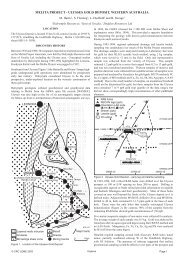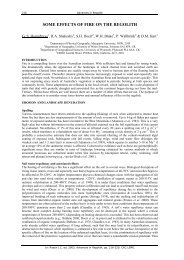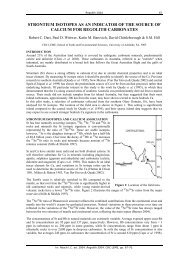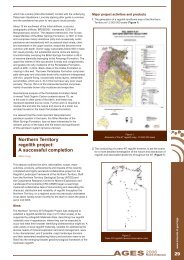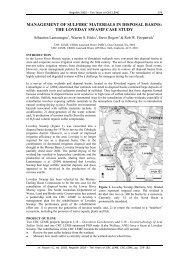OFR 151.pdf - CRC LEME
OFR 151.pdf - CRC LEME
OFR 151.pdf - CRC LEME
You also want an ePaper? Increase the reach of your titles
YUMPU automatically turns print PDFs into web optimized ePapers that Google loves.
Accordingly, only at sites with exceptional resolution will short-term changes be preserved in<br />
the fossil record. Australian examples are rhythmites at Lemonthyme Creek, north-west<br />
Tasmania (Early Oligocene), and Yallalie, south-west Western Australia (mid Pliocene).<br />
High levels of biodiversity seem to be restored by ~10 million years after major extinction<br />
events (cf. Erwin 1998, 2000; Gaston 2000).<br />
1.3.8 Fire and soil fertility<br />
Over shorter periods of time, the role of climate becomes more ambiguous whilst the<br />
influence of other factors such as soil drainage, soil fertility and the frequency/intensity of<br />
wildfires and other disturbances become more pronounced on the local to regional scale<br />
(references in Fox 1999 for mainland Australia, Jackson 1968, 1999, Macphail 1979, 1980 for<br />
Tasmania, Ogden et al. 1996 for New Zealand, Read and Hope 1996 for New Guinea and<br />
New Caledonia, Peres 1999 for South-East Asia, and Veblen et al. 1996 for South America).<br />
Hill (1998a, 1998b) has restated the distinction between the morphological response of plants<br />
to low levels of soil nutrient such as phosphorus (scleromorphy), and low soil moisture levels<br />
(xeromorphy), but notes that these forcing factors and wildfires have 'genuinely overlapped' in<br />
Australia since Late Eocene times and scleromorphic and xeromorphic plants are well adapted<br />
to the ubiquitous presence of fire in the modern landscape (‘fire-requiring and promoting’<br />
species).<br />
Low intensity wildfires may help increase regional rainfall in that low concentrations of<br />
smoke particles help water droplets form. However, recent forest fires over South-East Asia<br />
have confirmed that very dense smoke haze 'turns off' normal tropical rainfall due to oversaturation<br />
of the atmosphere with small particles (Adler 1999). For this reason,<br />
anthropogenic wildfires are suggested to be partly responsible for the decline in rainfall seen<br />
in the tropics over the past century. Periods of intense volcanic activity and/or meteor impact<br />
almost certainly will have had similar consequences on the local to regional scale (Kerr<br />
2000).<br />
1.3.9 Vagility and vicariance<br />
Plants differ greatly in their ability to disperse propagules such as spores and seeds into the<br />
surrounding landscape (vagility).<br />
The relatively high levels of endemism (vicariance) in Australasian rainforest floras is<br />
attributed to the low vagility of many rainforest species (Barlow 1981, Dawson 1986, Hartley<br />
1986, Morat et al. 1986, Thorne 1986, Webb et al. 1986, Whiffen and Hyland 1986).<br />
Nevertheless, fruits, seeds and seedlings of mangroves and other strand plants are routinely<br />
found on the beaches on cays in the south Coral Sea, confirming that plant propagules can<br />
drift from as far away as Fiji, Vanuatu and New Caledonia to Australia (Smith 1992).<br />
Similarly, palynostratigraphic evidence confirms that many woody and some herbaceous<br />
plants have been able to cross wide ocean gaps, including to New Zealand and Ninetyeast<br />
Ridge in the Indian Ocean (Kemp and Harris 1977, Macphail et al. 1994). These data<br />
demonstrate that chance dispersal events, many of which are of intrinsically very low<br />
probability due to the low vagility of the species concerned, have occurred during Early<br />
Tertiary when Australia was surrounded by wide oceans. Conversely during the Late Tertiary<br />
when Australia has been close to South-East Asia, only limited floristic interchange has taken<br />
place due to the lack of suitable ‘target’ habitats in northern Australia (Macphail 2000).<br />
42



